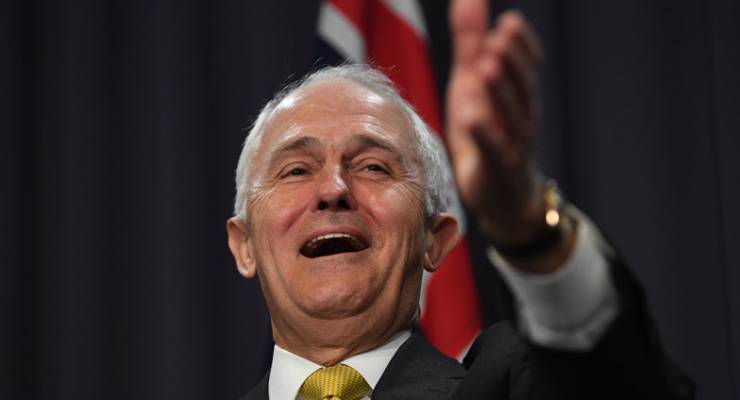
Sometimes it seems as if Prime Minister Malcolm Turnbull has an “on/off” switch, and when it comes to announcing government decisions that contradict his previously held convictions, the switch is firmly set to “on”.
That’s how it was when Turnbull swept into the Blue Room at noon on Tuesday, checking his watch on the way in, to announce the government’s decision to have a second go at passing a compulsory plebiscite on marriage equality and that the government had found the technicalities it needed to run a non-compulsory postal plebiscite without having to go through the obdurate Senate.
The PM was excited and smooth-talking. It was almost as if LGBTI people and his own conviction were missing completely from his mind as the PM talked about what makes a good leader: keeping promises, even if they are bad ones, it seems.
As well as using his usual lines against Labor leader Bill Shorten, he name-checked former PM Julia Gillard and the carbon tax. “Fundamental to political leadership is integrity and trust. We all know what happens to governments that break their promises.”
The room absolutely packed with journos, they were desperate to get their questions in, the break leaving everyone hungry to validate their take.
[Marriage equality postal plebiscite — statisticians to the rescue!]
“Strong leaders carry out their promises. Week leaders break them. I’m a strong leader,” he retorted to a question from Seven’s Mark Riley, showing he could play the passive-aggressive game just as well as his predecessor, Tony Abbott. As he often does, Turnbull implored journalists on the basis that they had followed him around the country on the election campaign, or around Western Australia last week, so the answers he was giving must seem obvious. He kept his cool, taking every challenge as if it were an invitation to show just how happy he was about this course of action, however compromised.
It was left to Finance Minister Mathias Cormann to explain the ways in which the government would use the Australian Bureau of Statistics, as well as the Australian Electoral Commission, to actually run the postal plebiscite. The $122 million to pay for it all would come out of funds that can be directed by the Finance Minister without having to pass legislation.
Turnbull’s enthusiasm for giving all Australians their say and keeping his promises only dropped when it came to questions about whether or not he himself would campaign for the yes side. Sidestepping the question, he said he would be voting yes, as would his wife, Lucy, and he encouraged everyone to do so. But he couldn’t help but say: “Other people have different views on that fundamental issue and I respect their views and [they] are entitled to them.”
When it came to question time, the PM was still “on” — this time using marriage equality to have a go at Opposition Leader Bill Shorten, and again side-stepping questions on how a postal plebiscite would affect LGBTI Australians, and whether the idea of a non-compulsory vote with low participation would actually leave the country feeling like we have a legitimate result.








Integrity? It was the integrity of The Greens that brought us the carbon tax, as their price to join the Green-Labor coalition government. Julia would have lost less skin if she had spelled out “No Labor Government I lead shall ….”
*eye roll*
Yes, this is all about Julia….
… and Dodger’s beloved nukes – he can allude to them no matter the topic under discussion.
Quite a talent, however misapplied.
….and Julia did say, quite clearly, she would introduce an emissions trading scheme in her next term of government. There was no doubt about her long term vision. Vision? Now that is something no Conservative Prime Minister as ever had, including Turnbull.
I am sure this ‘peculiar talent’ is a consequence of MT’s time as a barrister. Then he could and would have advocated for any position no matter how objectionable as long as he was instructed to do so by his client. This would not have troubled his conscience at all. Its not too hard to work out who the clients are these days, and for Malcolm its business as usual.
Our Malcolm needs to remember he is the Prime Minister and leader of this country, and NOT a barrister delivering on a brief.
He’s a lawyer ffs.
Being a brief means having no beliefs, just bloviating for cash.
Mal Talkbull,
I recon he hasn’t had a principle since he left highschool.